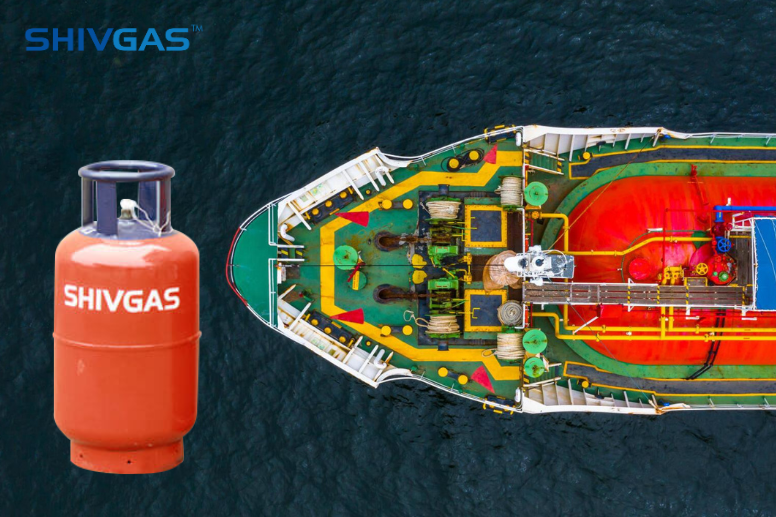
The enterprise chargeable for transporting approximately 90% of the sector's trade, goes through developing stress to lessen its environmental footprint. With tightening pointers and developing interest in the need for sustainable practices, the look for purifier gasoline alternatives has intensified. As the global maritime industry is expected to grow from 2023 to 2030, it is evident to look forward towards sustainable fuel options. One such fuel is Liquified Petroleum Gas(LPG). As a private gas company, and having multiple private gas agencies, it is an opportunity to delve into new sectors to create a sustainable environment. Let’s get into the blog to know the role of LPG in commercial application.
Liquefied Petroleum Gas, commonly referred to as LPG, is a flexible electricity supply normally composed of propane and butane. It is a byproduct of natural gasoline processing and crude oil refining. LPG is notably used for heating, cooking, and powering cars. However, its capability as a marine gasoline is an increasingly number of being recognized because of its lower emissions in comparison to traditional marine fuels collectively with heavy gas oil (HFO) and marine diesel oil (MDO).
As per data reports, The International Maritime Organization (IMO) has the objective to lower emissions from international transport by 50% by 2050, encouraging the development of decarbonized technology like LPG.
Why??
Because, LPG is identified for generating negligible amounts of sulfur oxides (SOx) and particulate counted (PM), and it generates approximately 18% fewer greenhouse gas emissions than heavy fuel oil (HFO).
As a private gas company, with multiple private gas agencies associated with us, we ensure to provide 100% imported and propane-rich LPG that ensures it has minimal impact on our environment.
LPG is a convenient and easy-to-burn fuel historically used for heating, cooking and transportation. However, its usefulness in the marine sector has been largely constrained until modern years. With increasing environmental advisory and greater emphasis on reducing greenhouse gas emissions, fleet owners and operators are turning to potential fuels such as LPG to consume that meet the stringent requirements
As per the records available today, 91 LPG suppliers have already adopted LPG as fuel supplier on board, and are ready for all propulsion power mainly based on LPG, can has been a promising option with the same LPG 90 3 containing retail customers
Of particular note is that these orders represent a substantial amount, taking up 20% of the total fleet, and are accumulated in the near term In 2023, a significant increase is expected 13% will occur, which translates to five The equivalent of 200,000 cubic meters a year, regardless of any scrapping already assessed.
In this context, VLGC (Very Large Gas Carrier) orders lead the way, boasting a 24% order book to fleet ratio. Specifically, the VLGC fleet is predicted to increase by 14% in 2023, an increase of 4% in 2024 and a subsequent 5% increase in 2025 before any fleet exemptions are taken into account where the supplier It is worth mentioning that most of those nine households choose LPG as their Secondary onboard gas distribution.
Several groups and distribution companies have already begun to investigate the use of LPG as a marine fuel. For example, BW LPG, one of the world’s most important suppliers of LPG, initiated trials to assess the feasibility of reconfiguring ships to run on LPG as well as the company and Getting to Zero Collision objective of increasing acceptance of zero emission fuels including LPG in maritime space.
As the Maritime Company continues to do bold work in the path of decarbonization and sustainability, the installation of fuel possibilities such as LPG is expanding. With continuous technological advances, infrastructure improvements and regulatory frameworks, LPG has a unique potential as a viable alternative to marine fuel for commercial and industrial applications Yati By providing challenging conditions earlier implementation and utilization of LPG benefits, fleet owners can help near a greener and new environmental great marine sector.
You may read: Eligibility Criteria For LPG Distributorships
The adoption of liquefied petroleum gas (LPG) as a marine fuel offers a promising option for the maritime sector to reduce its environmental impact and comply with stringent regulations LPG appears to potential prospects for conventional marine fuels however , Complex conditions need to be addressed industry developments, safety considerations, regulatory frameworks and market developments to facilitate widespread adoption
Despite those demanding situations, the momentum in the again of LPG adoption is large, as evidenced using manner of the growing quantity of vessels retrofitting or ordering LPG-based totally propulsion structures. Industry tasks and collaborations in addition bolster this style, signalling a collective willpower to decarbonise the maritime region.
Looking ahead, persevered funding in the era, infrastructure, and regulatory frameworks may be critical to unlocking the whole ability of LPG as a marine gasoline. Shivgas, with our private gas agencies, has been proactively collaborating with stakeholders, and addressing the challenges paving the way for a greener future.
In this proliferation, Shivgas is equipped with technology and supply chains that include LPG gas dealerships catering to marine industry requirements.
Want an LPG gas dealership? Then connect with us by mailing us at info@shivgas.com
Comment (0)